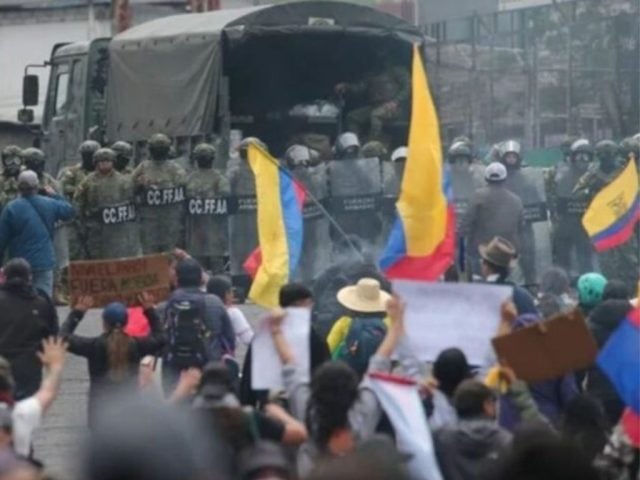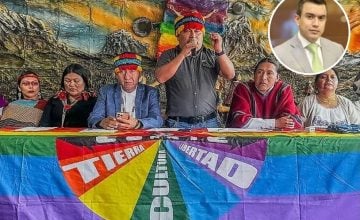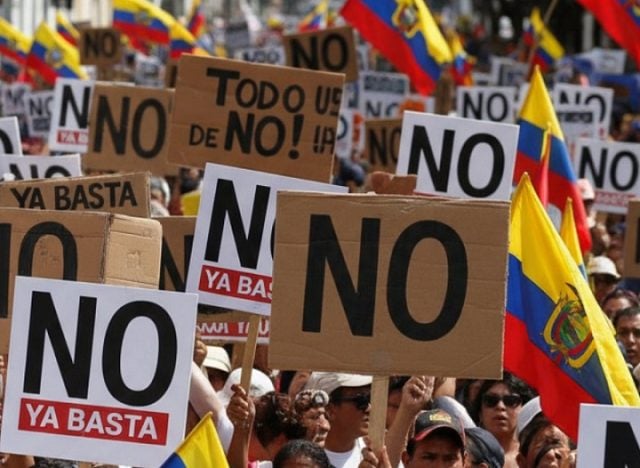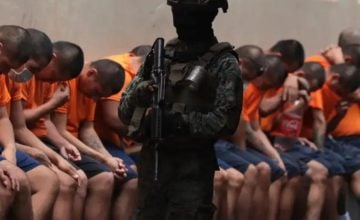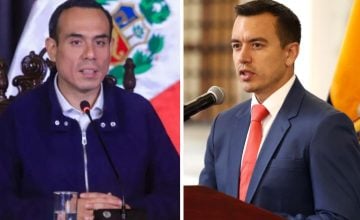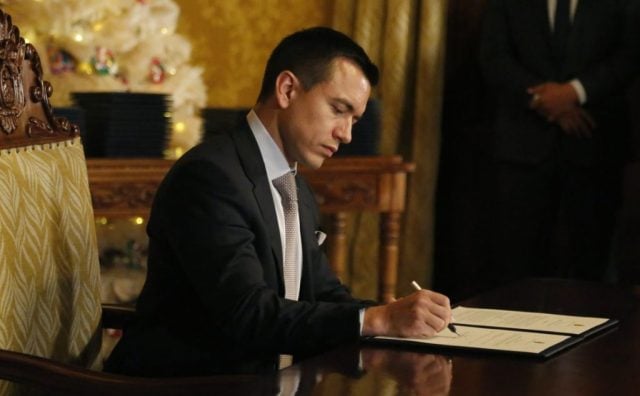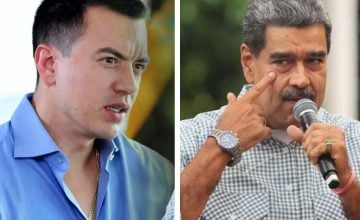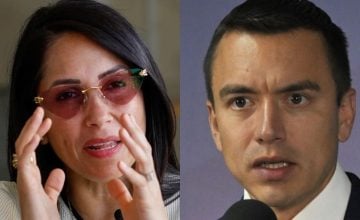Original article: Ecuador: ONG valida 391 violaciones de DD.HH. tras paro indígena; 2 muertes por violencia pública, 473 heridos y 206 detenidos
The national strike called by the Confederation of Indigenous Nationalities of Ecuador (Conaie) from September to October 2025 resulted in a tragic toll of two fatalities from public violence, along with 473 injuries, 16 short-term disappearances, and 206 arrests, as confirmed by the human rights organization in the South American nation.
The Alliance of Organizations for Human Rights presented their verification report on Wednesday about the events during the 31 days of mobilizations, documenting 391 validated human rights violations attributed to police repression ordered by the government of Daniel Noboa.
«The information presented here has been cross-referenced with official reports, direct testimonies, and records from the organizations that comprise the Alliance and other social groups. For this monitoring, we received 744 alerts, which have been reviewed and verified,» the report stated.
According to the organization, out of the 391 reported violations, 155 instances concerned violations of personal integrity; 84 reports related to infringements on the right to protest and resist; 44 involved incidents against personal freedom; 36 were breaches of freedom of expression; 14 where the right to defend rights was threatened; 11 involved threats to the right to property, all connected to the blocking of financial accounts; and 8 cases where the primary right under severe threat was the right to life.
Furthermore, 8 reports documented affected rights of incarcerated individuals regarding detention conditions; 4 involved the rights of children and adolescents; 4 involved encroachments on freedom of movement by state agents; 5 indicated violations of the prohibition against discrimination; 4 reports concerned collective rights; and 3 involved breaches of criminal justice rights.
«Additionally, we identified 5 reports where other rights were primarily affected: the right to gather, the right to privacy, the right to associate, violations of university autonomy, and the right to access effective resources,» the group noted.
Deaths From Police Repression Ordered by Daniel Noboa
The Alliance for Human Rights documented the deaths of Efraín Fuérez and José Guamán in Imbabura province.
Fuérez, a 46-year-old Kichwa leader, died after being struck by a bullet that fragmented upon impact. Reports indicate the shot entered through his back and exited through his chest, causing lung injuries and a cervical fracture.
The Conaie classified the killing of the community member as a «state crime» committed under the orders of President Daniel Noboa.
Guamán, a 30-year-old farmer from the Cachibiro community, was shot in the chest during a mobilization in Otavalo.
A third victim reported by Conaie was María Paqui, a 61-year-old from the Kichwa Saraguro community, who died from cardiac arrest after inhaling tear gas deployed by law enforcement.
The organization also warned of a pattern of arbitrary arrests and temporary disappearances. Among the most serious cases was that of Juan Aguilar Otavalo, who has a 75% disability and was missing for six days after being detained by military and police forces.
The report also documented the use of lethal weapons: rifles, 12-gauge shotguns, and tear gas fired directly at the bodies or faces of protesters, asserting that law enforcement acted with “unnecessary and disproportionate” violence, as reported by Radio Pichincha.
Strike Triggered by Elimination of Diesel Subsidy
It is essential to note that the strike, which lasted over a month, was initiated following the signing of Executive Decree 126 on September 12, through which the right-wing administration eliminated the diesel subsidy and raised its price from $1.80 to $2.80 per gallon.
This increase directly impacted transportation costs, agricultural production, and family economies of numerous sectors, particularly indigenous and rural communities reliant on diesel for productive activities and mobility. This led CONAIE, along with the United Workers Front (FUT), the National Students Coordinator (CONAES), and other groups to declare a state of permanent mobilization.
Through protests, citizens took to the streets of Ecuador to express their opposition to shortages of medical supplies, the legalization of mining and oil extraction in national reserves—including the Galapagos—and the systematic human rights violations committed since the declaration of the “Internal Armed Conflict” by the Executive.
Vivian Idrobo, a member of the human rights organization, criticized the Ecuadorian state for underreporting the figures and accused the Ombudsman’s Office of failing to fulfill its duties during the protests.
«Out of more than 700 reports we received, we validated 391, meaning that these reports constitute human rights violations. From those reports, we were able to identify various figures, including 206 individuals detained, 473 injured (at least 25 severely), and two fatalities due to public violence,» she explained at a press conference, as reported by TeleSUR.
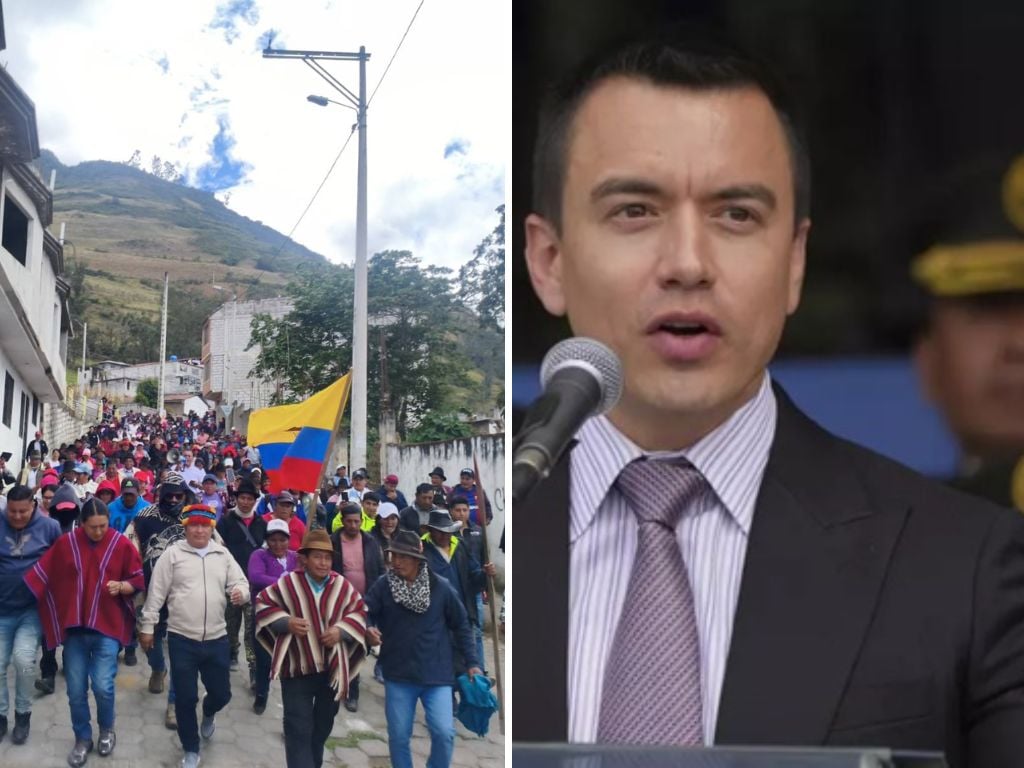
Noboa Does Not View Protest as a Citizen Right
María Espinoza, a human rights lawyer, addressed the causes that triggered the national indigenous strike in Ecuador.
«These causes relate to the clear weakening of civic and democratic spaces in the country; they involve a concentration of state authoritarianism, particularly in the hands of the Executive and the co-option of institutions, which are primarily becoming functional for the Executive’s agenda. Institutions that fail to serve this agenda are being attacked by the Executive,» she argued.
The specialist criticized the Noboa administration for viewing protest not as a citizen right but as a threat to the democratic system, as evidenced by the repression against citizens who took to the streets to demonstrate.
«This is why the government’s response to the right of social protest from day one was a military response, a stigmatizing response, and a response fueled by hate. Thus, we state in the report that there was never a legitimate or genuine willingness for dialogue on the part of the Executive,» the lawyer proposed.
Espinoza asserted that the Alliance for Human Rights highlighted the disproportionate use of violence by police forces and noted references emerging from the strikes of 2019 and 2022, reminding the Ecuadorian state that the lethal use of force is a last resort.
According to the NGO, the rights violations occur within a context of imposed economic measures.
«This is more grave considering, as analyzed, prior to the strike, the conditions of economic, social, and cultural rights in Ecuador were in evident decline. Furthermore, this was a measure adopted despite the continuous electoral campaign promises of then-candidate and current President Daniel Noboa not to do so,» the report stated.
The Alliance also raised concerns about a strategy of militarization in public spaces, which is supported by successive declarations of a State of Exception (nine to date in 2025) and the use of the term “internal armed conflict” to justify troop deployments.
The report details the use of lethal weaponry: rifles, 12-gauge shotguns, and tear gas launched directly at protesters’ bodies or faces. The organization concluded that law enforcement acted with “unnecessary and disproportionate” force.
Organizations denounced that the Executive ignored recommendations made by the Inter-American Commission on Human Rights (IACHR) after the 2019 strike, along with agreements reached in dialogue tables in 2022 regarding subsidy targeting.
